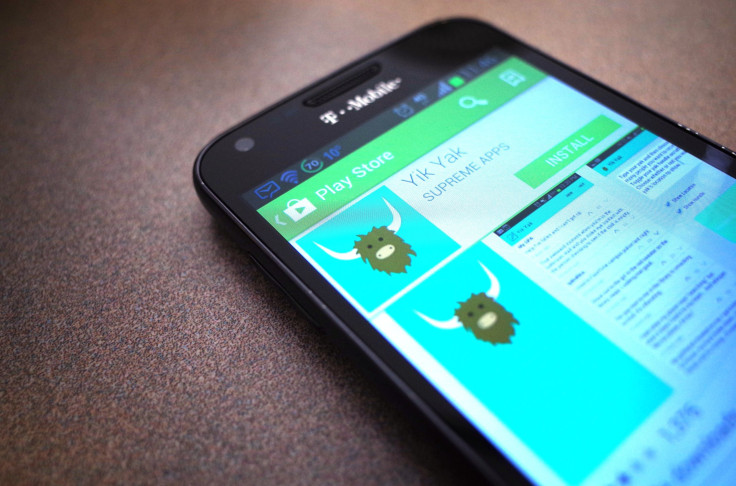Yik Yak Ban At Emory University Proposed After Racist Messages, Shooting Threat

Emory University is investigating the possibility of banning Yik Yak after hate speech allegations and an arrest were linked to the anonymous social media app earlier this year, Atlanta media report. The private college, which has about 14,800 students, could approach Yik Yak to set up a geofence around its campus, WABE reported Thursday. The move would prevent students from using the app when in the closed zone.
Yik Yak, which launched in 2013 and by last year had more than 3 million monthly active users, works based on location. This makes it popular for sharing school gossip -- but also enables negativity at places like Emory, according to WABE.
"It's not like this is some kid on a YouTube channel," student Manzi Ngaiza told the local NPR affiliate. "It's someone in your geographical area, so you know the fact that you're in class with someone who really feels that they need to share this sentiment of like ... 'Black kids at Emory need to go back to Africa'. It's not a good feeling, obviously."
The proposed Yik Yak ban was No. 11 on a list of demands from black students published last month in the Emory Wheel, a campus newspaper. The group wrote that it had encountered several instances of hate speech on Yik Yak, including one comment that read, "Let’s be real. Black lives matter is a sham. It’s not because you’re black. It’s because you’re selling crack and ran from a police officer."
In their list of demands, the students wrote that "it is impermissible to allow racist students to terrorize Black people on any form of media, and the anonymity that Yik Yak provides is a breeding ground for behavior of that sort."
It wasn't the university's first run-in with the app. In October, Emory police arrested a student accused of posting a message on Yik Yak reading, "I’m shooting up the school. Tomorrow. Stay in your rooms. The ones on the quad are the ones who will go first,” NBC News reported. Sophomore Emily Sakamoto was ultimately charged with making terroristic threats.
Peek into the Yik Yak convo at Emory's Oxford, GA campus in wake of shooting threat: http://t.co/M4hPRVl7r0 pic.twitter.com/NoqGi8IobK
— Erica A. Hernandez (@EricaAlyssa) October 12, 2015Other institutions have encountered similar issues. Yik Yak uses geofences to block middle and high schools from its system, but cyberbullying and threats have persisted at places like Michigan State and Clemson universities, the New York Times reported in March. Last month, more than 70 women's and civil rights groups sent a letter listing concerns about the app to the United States Education Department.
Yik Yak declined to comment on the matter to WABE.
© Copyright IBTimes 2024. All rights reserved.












